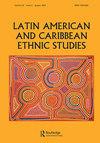‘Real Bahamians’ and ‘paper Bahamians’: Haitians as perpetual foreigners
IF 1
Q4 ETHNIC STUDIES
引用次数: 0
Abstract
ABSTRACT In the Bahamas, children born to undocumented migrants grow up without citizenship but are entitled to apply for it upon their eighteenth birthday. However, due to the stigma of having Haitian origin, Bahamians of Haitian descent continue to be othered racially and ethnically even after eventually becoming Bahamian citizens. In this essay, I argue that second-generation Haitian Bahamians are viewed as perpetual foreigners by mainstream Bahamians and continuously struggle to access the benefits of cultural and legal Bahamian citizenship. Structural and individual practices of ‘othering’ and exclusion have created notions of a two-tier system of citizenship in the Bahamas where some people are considered to be ‘real Bahamians’ and others are considered to be ‘paper Bahamians.’ Using semi-structured interviews with second-generation Haitian Bahamians with and without citizenship, participants reveal the ways they continue – or expect to continue – to experience discrimination and exclusion from Bahamian citizenship because of their Haitian ethnicity. Second-generation Haitians are often treated as perpetual foreigners and practices of individual and structural discrimination reproduce inequality and reflect the failure to fully integrate Haitians into Bahamian society.“真正的巴哈马人”和“纸巴哈马人”:海地人永远是外国人
摘要在巴哈马,无证移民所生的孩子在成长过程中没有公民身份,但在18岁生日时有权申请公民身份。然而,由于海地血统的耻辱,海地裔巴哈马人即使在最终成为巴哈马公民后,在种族和族裔上仍被排斥在外。在这篇文章中,我认为第二代海地巴哈马人被主流巴哈马人视为永久的外国人,并不断努力获得巴哈马文化和法律公民身份的好处。“他者化”和排斥的结构和个人做法在巴哈马产生了双层公民制度的概念,在这种制度中,一些人被认为是“真正的巴哈马人”,另一些人被视为“纸上的巴哈马人。”通过对拥有和不拥有公民身份的第二代海地巴哈马人进行半结构化访谈,参与者揭示了他们因海地族裔而继续——或期望继续——遭受巴哈马公民身份歧视和排斥的方式。第二代海地人往往被视为永久的外国人,个人和结构性歧视的做法再现了不平等,反映出海地人未能完全融入巴哈马社会。
本文章由计算机程序翻译,如有差异,请以英文原文为准。
求助全文
约1分钟内获得全文
求助全文
来源期刊

Latin American and Caribbean Ethnic Studies
Social Sciences-Cultural Studies
CiteScore
1.30
自引率
16.70%
发文量
22
 求助内容:
求助内容: 应助结果提醒方式:
应助结果提醒方式:


